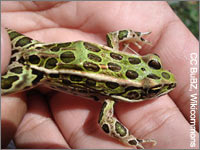Grange-Movement
Posted using ShareThis
Galápagos Tortoise May Be World’s Oldest Dad

The world’s “rarest living creature” may soon become the oldest living new father after almost a century of bachelorhood. Lonesome George, the last known Pinta Island giant Galapagos tortoise, has taken another stab at paternity after spending most of his lifetime celibate, despite repeated efforts by scientists to compel him to procreate. Last year, George finally discovered the joy of reproduction with a female of a different subspecies, but her eggs turned out to be infertile. Thankfully, he’s chosen another favorite female with whom to sow his precious seed, and the results — five new tortoise eggs — are now being incubated. We’ll know whether there’ll soon be a little George or Georgette in 120 days, when the eggs are scheduled to hatch. If they’re fertile, George will be the oldest natural papa on record at 90 to 100 years of age (according to scientists, still at his sexual peak). He may spur the manufacture of a “World’s Oldest Dad” mug — we can see it selling like hotcakes in a drugstore near you.
Stay tuned for another Lonesome George update in November, and listen now to a National Public Radio story on Lonesome George’s latest exploits.
Thoughts on abuse as substitute for missing nutritional components
The paper that I wrote suggests that ALL chronic smoking of marijuana is a symptoms of malnutrition, that the cannabis plant is a ‘symbiote’ to the human being, similar to the way that bamboo is to the panda bear and the eucalyptus is to the koala. We evolved from a form that was more like a slothy bear. I would imagine that drinking and anything else is a substitution for trying to find what is missing- Cannabis.
LOCAL HEROES
Leonard Stern, Ottawa Citizen – Henry and Vera Jones, as the Citizen reported this week, outed themselves as social radicals by publicly rejecting the ideal of a manicured lawn.
The couple have a big backyard in Constance Bay and some months ago decided to hell with watering, fertilizing, cutting and weeding. Henry is a former Fisheries and Oceans scientist who has some understanding of ecology, so he and Vera decided to create a natural green space in lieu of a lawn. They would let the grass grow, plant an assortment of butterfly-friendly plants and allow a mini-meadow to emerge.
The neighbors were not impressed. Someone complained to the city’s bylaw officials, who then sent the Joneses a letter threatening to come down there and cut the grass if the couple didn’t do it themselves. Unmowed lawns in Constance Bay will not be tolerated. The resistance must be put down. Order will be re-established.
The neighbors deny that this is about anyone’s refusal to conform. They say the Jones garden is attracting too many insects and critters to the area and thus diminishing the ability of others to enjoy their own properties. Still, it’s clear that the Joneses are in equal trouble for breaching a strict code of suburban etiquette. “It looks just awful,” said one disapproving neighbor.
The central irony of suburbia is that we give the streets names like Meadow Grove and Orchard Drive while ensuring that all traces of meadows and orchards are erased. The appearance of an actual meadow is an act of rebellion.
More than a decade ago, the Canadian cultural critic Robert Fulford observed that the suburban lawn had become an instrument of public shaming and social control.
“[A] dandelion’s appearance on a lawn indicates that Sloth has taken up residence in paradise and is about to spread evil in every direction,” he wrote. Weeds demonstrate a “weakness of the soul,” announcing to the world that “the owner of the house refuses to respect the neighborhood’s right to peace, order and good government.”. . .
They say that clothes express the man, but in fact it’s the lawn that does. A large expanse of flat, weedless grass in front of your house conveys a bunch of social messages. It suggests discipline, an ability to tame the natural world. As Fulford says, lawns express an “imperialist personality.”
Lawns are examples of conspicuous consumption, and like other such symbols have status attached to them. The more wasteful your lifestyle, the more money you are seen to have.
Maintaining a large velvety front lawn is not as excessive as keeping a private jet or killing an elephant for its tusks, but it is a symbol of waste nonetheless. . .
The need to build denser and more efficient communities could spell the end of the road for the big green lawn. The environmentalist impulse behind denser communities and smart living has already interfered with lawn culture, in the form of pesticide bans. Without chemicals, the effort required to maintain the equivalent of a putting green on your property becomes much harder. . .
Right now the Joneses are being derided as non-conformist troublemakers. Someday, they might be hailed as trendsetters.
SAN FRANCISCO REQUIRES THAT EVERYONE COMPOST
Sacramento Bee – San Francisco, renowned for its civic will to save the planet, is now ordering residents and businesses to compost food scraps and biodegradables, or risk fines for not properly sorting their garbage.
That’s welcome news for Jepson Prairie Organics, a Dixon-based composting firm that already accepts delivery of 400 tons a day in plate scrapings, greasy cardboard and other sweet-stinking waste from San Francisco eateries and homes.. . .
For some 200 Northern California vineyards that use it, there is something about San Francisco compost and its unique, urban blend of crab shells from Fisherman’s Wharf, pasta from North Beach, pupusas from the Mission District and dim sum from Chinatown that nourishes the soil like little else.
Yet the question for San Francisco is whether the new city composting law signed by Mayor Gavin Newsom last month will nourish the city’s ecological soul or merely irritate the populace.
The new law gives the city authority to fine residents and small businesses $100  and impose penalties up to $1,000 on big firms and apartment owners  if they refuse to segregate leftover fish bones, watermelon rinds and watercress salad into compost bins.
Even in liberal San Francisco, which boasts of recycling 72 percent of its 2.1 million tons of waste a year, a few residents wonder if the law is a case of big compost meets Big Brother. . .
The city, which has had a composting program since the mid-1990s, has achieved voluntary participation from 50 percent of restaurants, 40 percent of single-family homes and 20 percent of apartments.
But the new law, designed to boost those rates by using the threat of citations, is drawing national media attention. . .
“All of a sudden, the headlines were ‘Garbage Police: They’re coming,’ ” Newsom mused in a signing ceremony for the law passed on a 9-2 vote by the Board of Supervisors. . .
Court Upholds Ban on Monsanto’s GE Alfalfa
Court Upholds Ban on Monsanto’s GE Alfalfa
Posted using ShareThis
Scientist Warns that Farmed Fish Could be a Source of Mad Cow Disease
A Critique of Some Recent Articles on GE Wheat
A Critique of Some Recent Articles on GE Wheat
Posted using ShareThis




